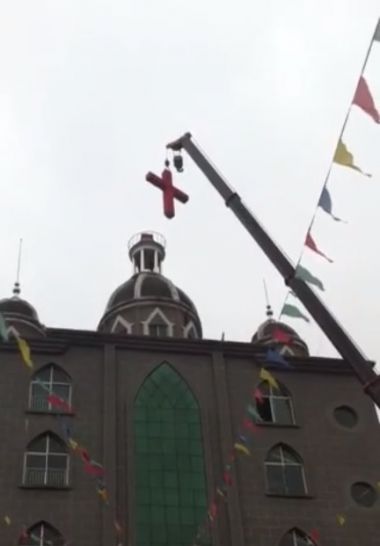China: Pastor's rights abuses lawsuit rejected in church demolition case

A Christian pastor in China remains imprisoned after claims that he has suffered rights abuses were rejected today.
Lawyers for Pastor Huang Yizi filed three seperate lawsuits against the local government and police department. Lawyer Zhang Kai told UCA news that Pastor Huang had been wrongly imprisoned. He was also told that if he dismissed his lawyers he would be released. When he did so in December 2014, he was not released. Zhang said the pastor's wife was also persuaded to dismiss legal counsel.
"I submitted three lawsuits to the court for Pastor Huang Yizi last week but the court has informed me today that it rejected taking up his cases," Zhang confirmed on Tuesday.
Pastor Huang, of Sjuitou Salvation Church in Wenzhou, Zhejiang province, was taken from his home on 2 August 2014, just over a week after an attack on the church. Police officers had attempted to remove a cross from its roof, resulting in a bloody clash with members who were guarding the building.
Police reportedly used iron batons to beat those who stood in their way, and one member of the congregation suffered a fractured skull. The cross was eventually removed from the church building.
Pastor Huang is accused of "gathering to assault a state organ," and now could face up to seven years in jail. He had previously written a blog saying that a crackdown on churches was an example of "severe persecution" and an "insult" to China's Christians.
This latest episode follows news that a Hong Kong journalist reporting on church demolitions in Zhejiang was detained by Chinese officials.
Jiang Yannan of Asiaweek says she was held for a short period after trying to interview people connected to churches which have been targeted by authorities in the region.
"I was here to do some reporting and interviews on the demolition of crosses...They didn't hold me for very long. They just stopped me from interviewing people," Yannan told Radio Free Asia.
A human rights lawyer involved in the case said that Yannan was "dragged into [a police] vehicle against her will". The journalist also said that the police had continued to follow her since her release, and are now "bothering the people I am trying to interview".
Chinese officials are now being "much tougher" on journalists than in the past, Yannan added. She has now left Zhejiang.
A local Christian in Wenzhou attributed Yannan's experience to continuing tensions between churches and local authorities in the region. These have been exacerbated by the plans to sue over the detention of Pastor Huang, he said.
The recent crackdown on churches in Zhejiang province, particularly in the city of Wenzhou, has led many to believe that the government is specifically targeting Christians in a bid to retain control. Estimates vary, but over 300 churches are thought to have been demolished, while many others have had crosses removed.
In November last year, a country expert told Christian Today that as China becomes more politically conservative, some churches face greater pressure to fall in line with the Communist Party.
Speaking anonymously, a spokesperson for Christian Solidarity Worldwide (CSW) said that there had been a "knock on effect" for Christians following the introduction of a hard-line approach to various parts of civil society by President Xi Jinping.
Demolitions "came out of the blue" to local pastors in the region, the researcher added.
"Wenzhou is known as China's Jerusalem, and churches in Zhejiang have been able to become wealthy and influential and have been largely left alone by the government, so it was a surprise to people when the authorities started to remove the crosses and demolish churches," the spokesperson said.
Although the right to freedom of religious belief is guaranteed under Article 36 of the Chinese Constitution, that protection is limited to those who worship within state-sanctioned religious bodies. Those who choose to practise their faith outside of these, or whose beliefs are not officially recognised by the government, are at risk of being accused of participating in illegal activities, which carries heavy punishment.
Even so, the first churches to be targeted by the CCP in the latest wave of attacks belonged to the state-sanctioned Three-Self Patriotic Movement.
"It's hard not to see it as an attempt to bring the registered Church into line with party policies. There's a feeling that they were perhaps becoming too independent, and so are being brought in," the China expert said, adding that additional pressure is being placed on some unregistered churches to come under the Three-Self umbrella.











